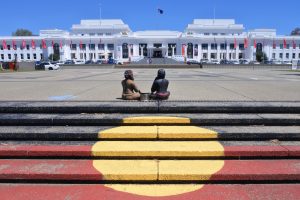The last federal election in Australia seemed to create a shift in Australian politics. Not only was it a comfortable win for the Labor Party, but the Liberal Party’s loss of many of its traditional strongholds indicated a more compelling change in what Australians wanted from their politics. Australians looked toward the United States, saw the chaos created by the Republican Party, and sent a strong signal to the Liberal Party that they do not want that kind of politics imported into their country.
This apparent new terrain signified to the incoming Labor government that conditions would be ripe for a referendum on recognizing Indigenous Australians in the constitution and establishing an advisory body to be known as the Voice to Parliament. Yet the referendum campaign has taken a different turn. With less than a month to go, current polling indicates that the referendum will fail (to pass, it would have to clear a double majority of the majority of overall voters, and a majority in four of the six states).
With four weeks before the vote there is plenty of time to turn things around, yet it is worth contemplating what might be happening with the Australian public, and why the last election may have created a blindspot for understanding Australian politics.
Although it is superficial – and incredibly unhelpful – to reduce politics to a binary, when seeking to understand Australian politics there is one broad binary that does govern the country: stability vs instability. As I’ve argued previously, Australians are conservative in temperament; they don’t like boat-rockers and see politics as mostly an administrative job, not one of cultivating emotions and souls. This is one of the reasons why Australia is mostly immune to populist chicanery, but is also why the country isn’t automatically progressive.
At the last election, the Liberal Party was clearly identified as a destabilizing force. In its current opposition to the referendum question the party is continuing with this behavior – actively seeking to create a sense of anxiety and confusion, and using an extraordinary linguistic ruse of claiming the referendum is “divisive” while simultaneously being the major force that is actively seeking to undermine it. It is a classic populist tactic to always accuse others of what you yourself are guilty of, and this time it is, unfortunately, working.
The reasons for this are complex. Unlike elections, which are mandated, referendums are optional. This is an important distinction to those who may take their duty as citizens seriously, but may not wish to be in a polling booth so frequently (given voting in state elections is also compulsory). There may be a sense of voter fatigue that is being exploited, and the government – having instigated the referendum – looks to be taking the blame.
Voter fatigue may also be compounded by a more general sense of fatigue. Cost of living pressures have placed an enormous stress on people’s lives. A sense of precarity understandably narrows people’s focus toward their immediate concerns; in that context, a referendum may seem like something that is not essential at present.
Yet the outcome of the referendum is of critical importance to Indigenous Australians, who live in a state of precarity far greater than the rest of the country. Closing the gaps in health and prosperity between Indigenous Australians and other Australians would undoubtedly be a stabilizing force (as well as being a moral imperative). And for this to be achieved, new mechanisms of engagement between the government and Indigenous communities need to be established.
To sell this, however, may require some counter-intuitive public engagement. Through its flagship advert, the Yes Campaign has tried to appeal to positive emotions and placed the vote in the context of other significant milestones in Australia’s recent history. Yet positive emotions are far more difficult to harness in political campaigns. The last federal election was a vote against instability, not for any great positive vision.
In this context could a wider appeal to Australians’ concern about destabilizing forces be the path forward? As Misha Zelinsky wrote in the Australian Financial Review last week, a No vote would be a massive gift to Australia’s adversaries:
You can take it as fact that nations hostile to Australia’s brand of multicultural, democratic openness are desperate for the referendum to fail… If democratic values are a superpower in the battle for hearts and minds, then hypocrisy is the kryptonite. Authoritarians love it when self-declared good guys fail to live up to their own promises. It undermines democracy for them.
Australians are keenly aware of these globally destabilizing forces, and how they are able to reach into Australia and create disruptions. Giving these actors an additional card to play does nothing to protect the national interest. But nor does the abandonment of Australia’s sense of themselves as a sober and practical people who may not have big ideas, but work diligently on solving problems. A new initiative to help Indigenous Australians achieve the outcomes most other Australians enjoy should be seen as keeping the ship afloat and pointing in the right direction.
































